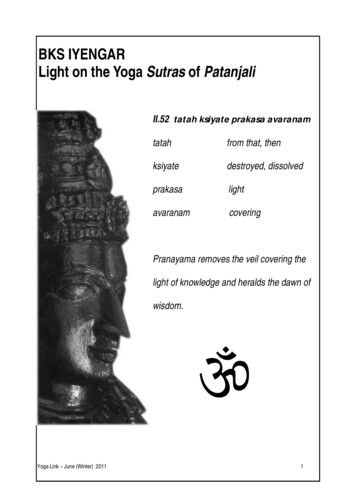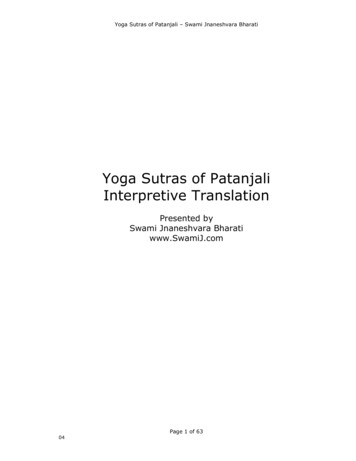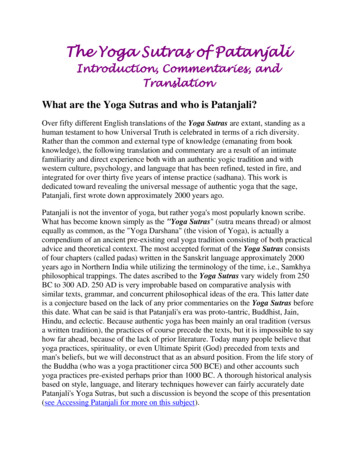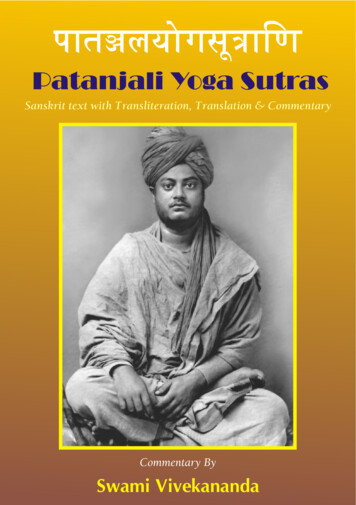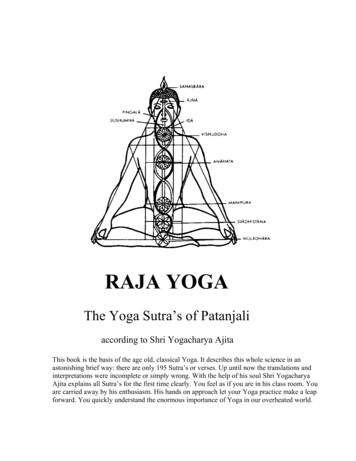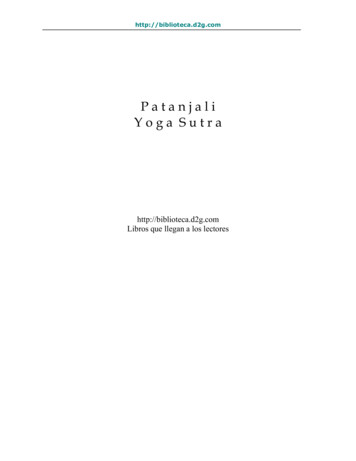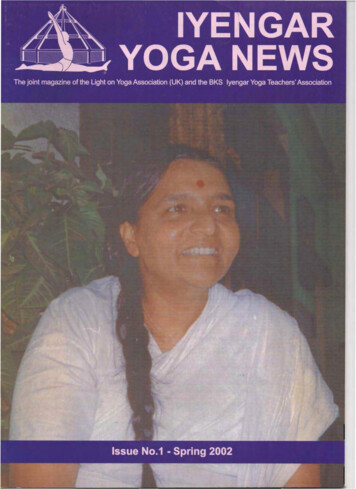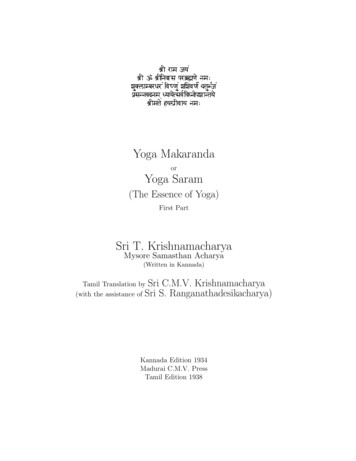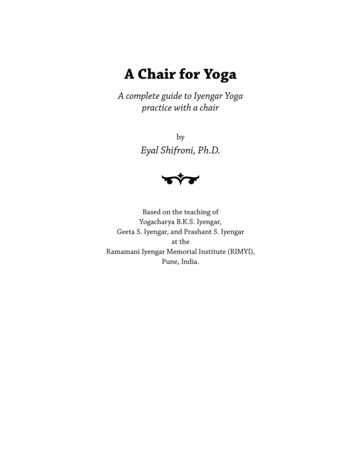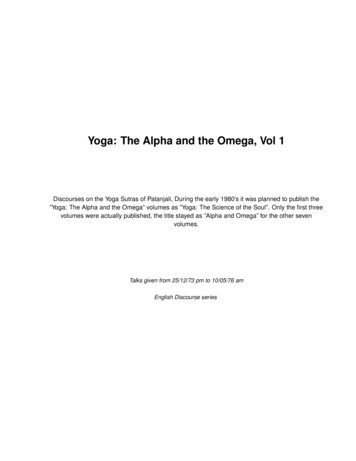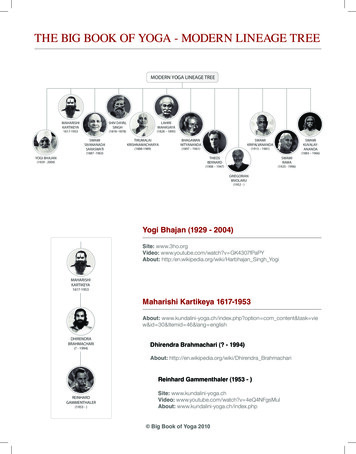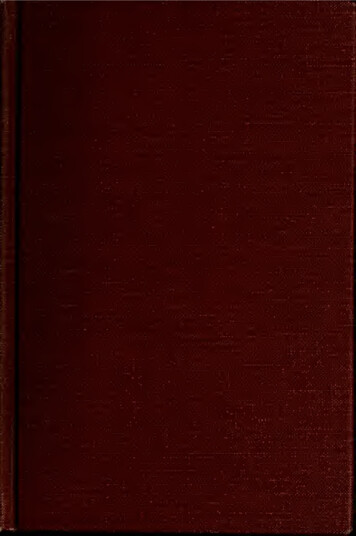
Transcription
'.*w vs» »'. Va-.v*c\."bv*W-V3'V ./' /jgSBf. .***/.'o.* ' «V»./.;*&:.%V.itt.A* - -*94»' .c* *
.V V V--Vfw«v Evv -v--as--v \**\ * * V** I *o.%
THEYOGA SUTRASvOFPATANJALITHE BOOK OF THE SPIRITUAL MANAnInterpretationByCHARLES JOHNSTONCHARLES JOHNSTONNew York1912
v% Copyright 191 2, byCharles Johnston.# ,-,
DEDICATEDWITH CORDIAL REGARDSTOCharles Rockwell Lanman
Introduction toBookITHEYoga Sutras of Patanjali are in themselves exceedingly brief, less than ten pages of large type in theoriginal.Yet they contain the essence of practicalwisdom, set forth in admirable order and detail. Thetheme, if the present interpreter be right, is the great regeneration, the birth of the spiritual from the psychical man the sametheme which Paul so wisely and eloquently set forth in writingto his disciples in Corinth, the theme of all mystics in all lands.think of ourselves as living a purely physical life, inthese material bodies of ours.In reality, we have gone farindeed from pure physical life for ages, our life has beenpsychical, we have been centered and immersed in the psychicnature.Some of the schools of India say that the psychicnature is, as it were, a looking-glass, wherein are mirrored thethings seen by the physical eyes, and heard by the physical ears.But this is a magic mirror the images remain, and take a certain life of their own.Thus within the psychic realm of ourlife there grows up an imaged world wherein we dwellaworld of the images of things seen and heard, and thereforea world of memories a world also of hopes and desires, offears and regrets.Mental life grows up among these images,built on a measuring and comparing, on the massing of imagestogether into general ideas on the abstraction of new notionsand images from these till a new world is built up within, fullof desires and hates, ambition, envy, longing, speculation, curi:We;;;;;;osity, self-will, self-interest.
PATANJALIS YOGA SUTRASThe teaching of the East is, that all these are true powersoverlaid by false desires; that though in manifestation psychical, they are in essence spiritual that the psychical man isthe veil and prophecy of the spiritual man.;The purposeof life, therefore, is the realising of thatthe unveiling of the immortal man the birth of thespiritual from the psychical, whereby we enter our divine inheritance and come to inhabit Eternity. This is, indeed, salvation, the purpose of all true religion, in all times.Patanjali has in mind the spiritual man, to be born fromthe psychical or in another sense, veiled by the psychical. Hispurpose is, to set in order the practical means for the unveilingand regeneration, and to indicate the fruit, the glory and theprophecy;;;power, of that newbirth.Throughthe Sutras of the First Book, Patanjali isconcerned with the first great problem, the emergence of thespiritual man from the veils and meshes of the psychic nature,the moods and vestures of the mental and emotional man.Later will come the consideration of the nature and powers ofthe spiritual man, once he stands clear of the psychic veils andtrammels, and a view of the realms in which these new spiritualpowers are to be revealed.At this point may come a word of explanation. I havebeen asked why I use the word Sutras, for these rules ofPatanjali's system, when the word Aphorism has been connected with them in our minds for a generation. The reasonis this: the name Aphorism suggests, to me at least, a pithysentence of very general application a piece of proverbial wisdom that may be quoted in a good many sets of circumstance,and which will almost bear on its face the evidence of its truth.But with a Sutra the case is different. It comes from the sameroot as the word "sew," and means, indeed, a thread, suggesting, therefore, a close-knit, consecutive chain of argument.Not only has each sutra a definite place in the system, butfurther, taken out of this place, it will be almost meaningless,and will by no means be self-evident. So I have thought bestto adhere to the original word.The Sutras of Patanjali areas closely knit together, as dependent on each other, as the;
BOOKIpropositions of Euclid, and can no more be taken out of theirproper setting.In the second part of the first book, the problem of theemergence of thespiritualmanisfurther dealt with.led to the consideration of the barriers to hisWeareemergence, of theovercoming of the barriers, and of certain steps and stages inthe ascent from the ordinary consciousness of practical life,to the finer, deeper, radiant consciousness of the spiritual man.
BOOKi.OM:I.Here follows Instructionin Union.Union, here as always in the Scriptures of India, meansunion of the individual soul with the Oversoul of the personalconsciousness with the Divine Consciousness, whereby themortal becomes immortal, and enters the Eternal. Therefore,;freedom from sin and the sorrow which comesand then a divine and eternal well-being, wherein thesoul partakes of the being, the wisdom and glory of God.salvationfromis, first,sin,2.Union, spiritual consciousness,isgained through controlof the versatile psychic nature.The goal is the full consciousness of the spiritual man,illumined by the Divine Light. Nothing except the obdurateresistance of the psychic nature keeps us back from the goal.The psychical powers are spiritual powers run wild, perverted,drawn from their proper channel. Therefore our first task is,to regain control of this perverted nature, to chasten, purifyand restore the misplaced powers.3.Then the Seer comestoconsciousness in his propernature.Ambiis but the perversion of spiritual being.the inversion of spiritual power. Passion is the distortion of love.The mortal is the limitation of the immortal.When these false images give place to true, then the spiritualman stands forth luminous, as the sun, when the clouds disEgotismtionisperse.
PATANJALIS YOGA SUTRAS4.offHeretofore the Seer has been enmeshed in the activitiesthe psychic nature.The power andlifewhich are the heritage of theman have been caught and enmeshedspiritualin psychical activities.Instead of pure being in the Divine, there has been fretful,combative egotism, its hand against every man. Instead of thelight of pure vision, there have been restless senses and imaginings. Instead of spiritual joy, the undivided joy of pure being,there has been self-indulgence of body and mind. These areall real forces, but distorted from their true nature and goal.They must be extricated, like gems from the matrix, like thepith from the reed, steadily, without destructive violence.Spiritual powers are to be drawn forth from the psychicmeshes.The psychic activities are five; they are attended by5.pleasure or pain.The psychic nature is built up through the image-makingpower, the power which lies behind and dwells in mind-pictures.These pictures do not remain quiescent in the mind;they are kinetic, restless, stimulating to new acts. Thus themind-image of an indulgence suggests and invites to a new indulgence the picture of past joy is framed in regrets or hopes.And there is the ceaseless play of the desire to know, to penetrate to the essence of things, to classify.This, too, busies itself ceaselessly with the mind-images.So that we may classifythe activities of the psychic nature thus;6.Theseactivities are:lection, phantasy,Soundintellection,unsoundintel-dream, memory.We have here a list of mental and emotional powers; ofpowers that picture and observe, and of powers that pictureand feel. But the power to know and feel is spiritual and immortal. What is needed is, not to destroy but to raise it fromthe psychical to the spiritual realm.8
BOO K7.The elementstion, inductive reason,Iof sound intellection are: direct observaand trustworthy testimony.Each of these is a spiritual power, thinly veiled. Directobservation is the outermost form of the Soul's pure vision.Inductive reason rests on the great principles of continuity andcorrespondence and these, on the supreme truth that all life isof the One. Trustworthy testimony, the sharing of one soulin the wisdom of another, rests on the ultimate oneness of all;souls.8.Unsoundintellection is false understanding, not restingon a perception of the true nature of things.The great example of unsound intellection is materialism,whereby to the reality and eternity of the soul is attributed theevanescence and perishableness that really belong to materialthings. This false reasoning, therefore, rests on a reversal ofthe true nature of things.9.Phantasyisa fiction ofmere words, with no underly-ing reality.One may say, perhaps, that there is this difference betweenimagination and fancy imagination is the image of unseenthings, which are real fancy is the imaging of unseen thingswhich are unreal. The power of phantasy has a wide scopeand range. Ambition, whereby a man sets up within his mindan image of himself, great, rich, admired, to which all menshall bow down, is a form of phantasy. The pursuit of wealthis largely phantasy, for men seek not commodities but food fortheir cowardice and conceit. The fear of death is a phantasy,nourished on images of tombs and funerals and black robes.All these are fictions, with no underlying reality.:;
PATANJALIS YOGA SUTRAS10.Dreamisthe psychic condition which rests onmindstates, all material thinge being absent.In waking life, we have two currents of perception anouter current of physical things seen and heard and perceivedan inner current of mind-images and thoughts. The outer current ceases in sleep the inner current continues, and watchingthe mind-images float before the field of consciousness, we;;"dream."ii.Memoryisthe holding fast to mind images of thingsperceived.Here, as before, the mental power is explained in terms ofmind-images, which are the material of which the psychicworld is built. Therefore the sages teach that the world ofour perception, which is indeed a world of mind-images, isbut the wraith or shadow of the real and everlasting world.In this sense, memory is but the psychical inversion of thespiritual, ever-present vision.That which is ever before thespiritual eye of the Seer needs not to be remembered.12.The control of these psychic activities comes throughthe right use of the will, and through ceasing from self indulg ence.If these psychical powers and energies, even such evilthings as passion and hate and fear, are but spiritual powersfallen and perverted, how are we to bring about their releaseand restoration ? Two means are presented to us the awakening of the spiritual will, and the purification of mind andthought.:10
BOOK13.Theright use of the willIisthe steady effort to standin spiritual being.Wehave thought of ourselves, perhaps, as creatures moving upon this earth, rather helpless, at the mercy of storm andhunger and our enemies.are to think of ourselves asimmortals, dwelling in the Light, encompassed and sustainedby spiritual powers. The steady effort to hold this thought willawaken dormant and unrealised powers, which will unveil tous the nearness of the Eternal.We14.This becomes a firm resting place,when followedlong,persistently, with righteousness.Wemust seekspiritual life in conformity with the lawswith righteousness, humility, gentle charity,which is an acknowledgement of the One Soul within us all.Only through obedience to that shared Life, through perpetualremembrance of our oneness with all Divine Being, our nothingness apart from Divine Being, can we enter our inheritance.of spirituallife,Ceasing from self indugence is conscious mastery over15.the thirst for sensuous pleasure here or hereafter.Rightly understood, the desire for sensation is the desireof being, the distortion of the soul's eternal life. The lust ofsensual stimulus and excitation rests on the longing to feelone's life keenly, to gain the sense of being really alive. Thissense of true life comes only with the coining of the soul, andthe soul comes only in silence, after self-indulgence has beencourageously and loyally stilled, through reverence before thecomingsoul.1
PATAN.TALIS YOGA SUTRAS1 6.The consummation of this is freedom from thirst forany mode of psychical activity, through the establishment of thespiritual man.In order to gain a true understanding of this teaching,study must be supplemented by devoted practice, faith byworks. The reading of the words will not avail. There mustbe a real effort to stand as the Soul, a real ceasing from selfindulgence.With this awakening of the spiritual will, andpurification, will come at once the growth of the spiritual manand our awakening consciousness as the spiritual man andthis, attained in even a small degree, will help us notably in ourcontest. To him that hath, shall be given.;That spiritual vision which is conditioned and limited17.takes the form first of exterior reasoning, then of interior judgment, then of happiness, then of realisation of individual being.In spiritual consciousness, there are two clearly markedThe first is spiritual consciousness expressing itselfthrough the psychical, through reason and feeling. The secondis spiritual consciousness clear of the psychical, and shiningforth luminous, in its own proper being. The first is here defined in its ascending stages, as first the right training and disposition of the reason next, the finer perception of intuitionnext the joy and exaltation which comes with the realisation ofspiritual life and then the awakening to the being of the soul,though not yet to the knowledge of the soul's oneness with thestages.;;All.18.Spiritual consciousness unlimitedup to by the right practice ofisthe final state ledspiritual Silence.crown and end of purification. Itand psychic storms, those dramaticfictions through which we seek the sense of real life, whichneeds no storm to reveal it, but is innate in the soul, and madeisSpiritual Silence is thethe stilling of all passionalmanifest through Silence.12
;BOO KIThe external world still dominates
the yogasutras v of patanjali thebookofthespiritualman aninterpretation by charlesjohnston charlesjohnston newyork 1912
